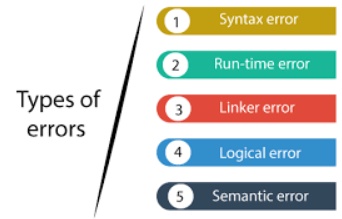Programming is sophisticated and difficult, requiring close attention to every little detail. Even the most seasoned programmers occasionally make grammatical mistakes. When a piece of code deviates from the syntax conventions of the computer language, it cannot be correctly compiled or run. In this post, we'll look at some of the most typical syntax problems programmers make and offer troubleshooting advice to make it easier to see and fix them.
While creating Python code, have you seen an error message such as "SyntaxError: unexpected EOF while parsing"? Although this is a usual error, the solution is usually rather straightforward.
Missing or Incorrect Parentheses
One of the most common syntactic mistakes is forgetting to close a parenthesis or employing them improperly. Unexpected behavior or full code failure may result from this mistake. Check the code carefully to ensure all brackets are in place to fix this problem. To fix this problem, carefully examine the code and ensure all brackets, including those in function calls and conditional expressions, are appropriately matched.
Unclosed Quotation Marks
Using unclosed quotation marks is another typical mistake. This often occurs when strings are declared or used as parameters in functions. Ensure that every opening quote mark is followed by a closing one by checking your code twice.
Spelling mistakes in keywords or variable names
Spelling mistakes in keywords or variable phrases can cause syntax issues. Because programming languages are case-sensitive, even slight differences in spelling might cause problems. Review your code carefully, paying close attention to the spelling of keywords and variables, to avoid making this mistake. To reduce the possibility of spelling errors, stick to consistent name practices.
Incorrect Indentation
Many computer languages use indentation to define code blocks. Incorrect indentation can change the logic of the program or result in syntax issues. To guarantee accurate alignment of opening and closing braces or tabs, utilize consistent indentation throughout your code.
Semicolons that are missing or in the wrong place
Semicolons are used to end sentences in languages like C, C++, and Java. Syntax mistakes can occur when a semicolon is omitted or placed improperly. Check your code thoroughly to ensure semicolons are present where they belong, especially after each sentence.
Use of Operators Incorrectly
When conducting logical or mathematical processes, wrong operator usage might result in syntax mistakes. Make sure you are using the appropriate operator for the desired operation. Make that the operands are properly specified, and the right operator is being used for the desired operation.
Missing or Incorrect Braces
Braces must be used to encapsulate the proper code blocks when working with conditional statements or loops. Syntax problems might result from remembering to use brackets or arrange them correctly. By carefully reviewing your code, ensure all the opening and closing brackets are placed correctly.
Misuse of Comments
Although comments do not impact how code is executed, they are essential for comprehension and documentation. Incorrect usage of comments might result in syntax mistakes. Avoid commenting out entire code sections or failing to close multiline comments to prevent unexpected mistakes.
Invalid Function Calls
When performing function calls with invalid parameters or missing brackets, syntax issues may arise. Verify the arguments match the specified parameters by looking at the function's signature. Additionally, make sure you call the function correctly using the appropriate brackets.
Confusion between the Assignment and Comparison Operators
When the assignment operator "=" and the equality operator "==" are used interchangeably, unexpected behavior and syntax problems can result. Keep in mind that the equality operator compares values, but the assignment operator is used to assign values to variables. Double-checking your code to ensure you are using the right operator for the job at hand.
Combining Data Types
In certain programming languages, combining incompatible data types can lead to syntax issues. For instance, trying to concatenate integers and strings or performing arithmetic operations on strings may result in unexpected failures. To prevent syntax problems, ensure you are utilizing data types compatible with the required operations.
Unclosed Control Structures
The appropriate opening and closing syntax is necessary for control structures like loops and conditional expressions. Syntax mistakes can happen if a loop or an if statement isn't closed. Ensure the indentation is uniform and all control structures are opened and closed appropriately.
It is important to include essential import lines to avoid syntax problems when accessing functions or classes from other modules or libraries in languages that enable modular programming. Verify that you imported all necessary modules and libraries. Ensure you import all necessary modules and libraries at the start of your code.
Unbalanced Square Brackets
Square brackets must be properly balanced, especially in arrays or indexing operations. Square brackets can be misused or left open, resulting in syntactic mistakes. Make sure that all square brackets are coupled appropriately by carefully reviewing your code.
Conclusion
Even for seasoned coders, syntax mistakes are an unavoidable aspect of programming. However, you can quickly spot and fix these mistakes if you pay close attention to detail and troubleshoot organizationally. You'll be better able to debug your code efficiently and write solid and error-free programs if you comprehend the typical syntax problems covered in this article and adhere to the provided troubleshooting advice.


No comments yet